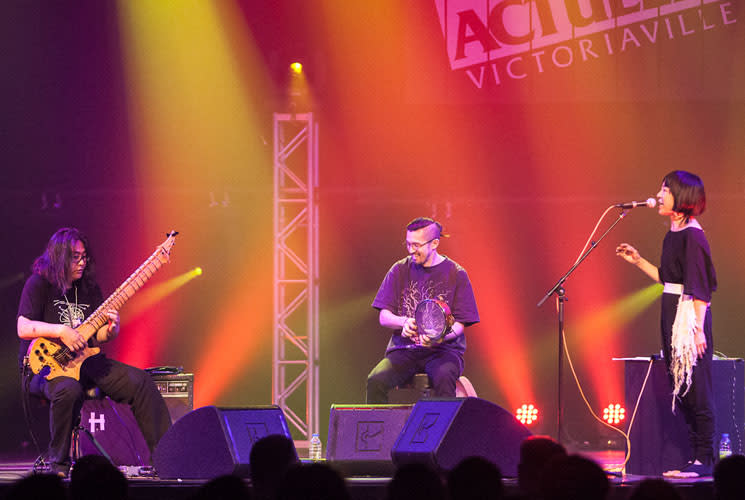An evening of Japanese music at FIMAV kicks off with a double bill by Phew (Hiromi Moritani), and Saicobab, a trio led by Boredoms founder and leader of OOIOO, Yoshimio.
Phew's musical origin dates back to the late '70s, in the Japanese punk scene with Aunt Sally, and her solo/collaborative output through the '80s and '90s maintained a heavy rock / progressive / experimental bent. Somewhat absent through the early '00s, Phew's focus over the last decade has drifted towards electronics, voice manipulation and textual presentation.
Her performance on the large Colisée stage was fairly modest, involving the deliberate crafting of non-lingual and mostly unmelodic vocal samples that were altered, layered and pinged between stereo channels, either atop deeply resonant soundscapes or as the backdrop for additional narration. Devoid of drama or any move towards crescendo, engagement was difficult. The most affecting moments tended to be when the samples dropped away, leaving Phew to deliver narration with a quiet vulnerability into the cavernous space.
The energy level centupled with the arrival of Saicobab. Drawing mainly from their 2017 Thrill Jockey release Sab Se Purani Bab, an unlikely showcase of mutated raga music from the Japanese trio.
Yoshida Daikichi played a home-crafted guitar / sitar hybrid with impressive dexterity, while percussionist Hamamoto Tomoyuki turned a tambourine taped with a contact mic into an improbably versatile tabla. Yoshimio was herself: charismatic and over-caffeinated, sing-chant-growl-yelping along closely to both the sitar melody line and/or the rhythm, electronically manipulating her vocals for pitch and echo along the way.
Despite the energy and excitement they brought, a certain repetition of delivery and technique, both within individual pieces and from composition to composition, started to bleed away some of the enthusiasm. Overall the double bill made for an enjoyable but slightly less than memorable affair.
Phew's musical origin dates back to the late '70s, in the Japanese punk scene with Aunt Sally, and her solo/collaborative output through the '80s and '90s maintained a heavy rock / progressive / experimental bent. Somewhat absent through the early '00s, Phew's focus over the last decade has drifted towards electronics, voice manipulation and textual presentation.
Her performance on the large Colisée stage was fairly modest, involving the deliberate crafting of non-lingual and mostly unmelodic vocal samples that were altered, layered and pinged between stereo channels, either atop deeply resonant soundscapes or as the backdrop for additional narration. Devoid of drama or any move towards crescendo, engagement was difficult. The most affecting moments tended to be when the samples dropped away, leaving Phew to deliver narration with a quiet vulnerability into the cavernous space.
The energy level centupled with the arrival of Saicobab. Drawing mainly from their 2017 Thrill Jockey release Sab Se Purani Bab, an unlikely showcase of mutated raga music from the Japanese trio.
Yoshida Daikichi played a home-crafted guitar / sitar hybrid with impressive dexterity, while percussionist Hamamoto Tomoyuki turned a tambourine taped with a contact mic into an improbably versatile tabla. Yoshimio was herself: charismatic and over-caffeinated, sing-chant-growl-yelping along closely to both the sitar melody line and/or the rhythm, electronically manipulating her vocals for pitch and echo along the way.
Despite the energy and excitement they brought, a certain repetition of delivery and technique, both within individual pieces and from composition to composition, started to bleed away some of the enthusiasm. Overall the double bill made for an enjoyable but slightly less than memorable affair.
